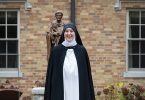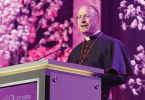Donnelly College launches new bachelor’s degree focusing on urban education
by Jessica Langdon
jessica.langdon@theleaven.org
KANSAS CITY, Kan. — Walking into a new school and finding herself surrounded by many people who didn’t speak Spanish was daunting for Cynthia Molina at age 11.
Now an adult, Molina remembers how she struggled starting school in the United States after arriving from Chihuahua, Mexico.
The 2009 Turner High School graduate looks forward to becoming a teacher herself and working with children in urban schools — including many whose first language isn’t English.
She will start working this fall semester on her bachelor’s degree at Donnelly College in Kansas City, Kan.
Molina will be among the first students to take part in a brand-new bachelor’s program at Donnelly — the Urban Teacher Education Program.
Brenda K. Harris, director of teacher education at Donnelly, came on board three years ago to develop and launch the program.
She’s lined out a rigorous curriculum, connected with surrounding school districts to give the future teachers extensive practical experience, and guided the program through the accreditation process.
Graduates of UTEP will receive a bachelor of science in elementary education and be prepared to teach students in kindergarten through sixth grade.
Knowing what to do
While UTEP equips future educators to teach in any setting, its focus is on the needs they might encounter in an urban school.
“A lot of times students come to class hungry, or they may have not gotten a lot of sleep because of things that have gone on in the home,” said Harris.
“Rather than saying, ‘Oh, I don’t know what to do,’” she continued, “we prepare them to know what to do.”
Another element of the program she’s particularly proud of is that graduates will earn their English for Speakers of Other Languages endorsement.
Teachers usually have to go back for this, but here, it’s built in, she said.
In Kansas City, Kan., public schools alone, there is rich diversity in cultures and languages.
“It’s beyond Spanish,” she added. “There are so many diverse cultures in the district.”
UTEP sends teacher candidates out to observe as freshmen, and the experiences intensify as they progress.
At the start of their senior year, they’ll be placed in the classroom where they will complete their student teaching.
“They’ll have that whole year to work in the same classroom to see how it runs beginning to end,” said Harris.
As juniors, UTEP students will be matched with established educators — mentors who will support them, offer insights, and serve as a sounding board through their first year of teaching.
Passion for kids
UTEP welcomes traditional and nontraditional students.
This might be a good fit for someone who has a degree and wants a career change, said Harris.
It’s also a way for people already working in schools — like paraeducators — to work toward leading a classroom.
It’s structured to allow them to continue working.
Molina loves the flexibility and Donnelly’s willingness to work with her.
She discovered the new program when Donnelly College gave a presentation about the degree to English as a Second Language aides in Kansas City, Kan., public schools.
Molina, who works as a secretary for the district’s ESL department, looks forward to student teaching and is excited about the idea of sticking with District 500 and its families in the future.
“I’m really hoping to do my best and really help them and engage with them — not only the students, but the parents as well,” said Molina.
The kids in the elementary classrooms drive Harris’ passion for this program, especially after her own daughter struggled in school.
Called Miss Molly by her family, her daughter had seizures from first grade until she was 14.
Though she is intelligent, she struggled in school.
“Not one teacher in her life — in her whole schooling experience — took the time to figure out who she was and how she learned,” said Harris. “It was just my goal to never, ever treat a child the way mine was treated.”
Through many prayers and hours of schoolwork at home after she had already spent the day in class, the family got her through and she’s now grown and working in a career she loves.
Harris knows there are great teachers out there and she can’t wait to send more into schools in the local area through UTEP.
The school districts that have jumped on board to work with Donnelly and host UTEP students in their classrooms are excited about the program, too.
Serving the community
“This program is right in our backyard. It’s right here,” said Eva Tucker-Nevels, district coach of professional learning and training for Kansas City, Kan., public schools.
She’s familiar with Harris’ work as a teacher and knows the quality and passion she brings to education.
This program fits right in with the district’s own vision of inspiring excellence.
Sending teachers into the workforce with their ESOL endorsement will be a big plus, believes Tucker-Nevels.
She’s also thrilled with the opportunities UTEP students will have to integrate theory they’re learning in their college classes into what they’re experiencing in the classrooms.
“They will be in the work while they are learning about the work,” said Tucker-Nevels. “It’s a complete, 360-degree involvement in the teaching world.”
Harris sees that Steve LaNasa, Donnelly College president, is “getting things off paper and into reality.”
Donnelly College has established a decades-long tradition in the urban core.
“It’s just more evidence of our commitment to serving this community and meeting the need,” said Lynn Hire, marketing coordinator at Donnelly College.
“What we want to do is grow our own teachers for our own metropolitan community,” said Harris.
Philanthropist inspires students
Henry Bloch is Jewish. But his “kids” go to a Catholic college.
That’s because Bloch, co-founder of H&R Block, has given his steadfast support to Donnelly College in Kansas City, Kan. And since 2001, 149 students have received an H&R Block Foundation scholarship.
In his commencement address to the graduates in May, Bloch talked about the grads’ responsibilities not only to themselves, but to others and their communities.
“Only you can choose to see the needs among your fellow citizens and respond to those needs, even though you still have needs of your own,” he said.
He was not an exceptional student as a young man, Bloch said.
He worked hard in school to earn a C. So one of the things he likes about his foundation’s scholarship program is that it requires students to maintain a C-plus average; they don’t have to be 4.0 students.
Given that — and the very real financial need facing many of the students — Bloch sees a sense of genuine appreciation from the scholars who attend Donnelly.
“Many of them are the first students in their family’s history to go to college,” he said, and, by that fact alone, they are making family history.
One program that has particularly impressed him is an on-site associate’s degree program at the Lansing Correctional Facility.
And the new Urban Teacher Education Program will hit a sweet spot he’d already identified.
“I keep telling them I hope some of them will be teachers because we need good teachers,” he said.
Although Bloch holds out hope that one day a Donnelly grad will be president, he’ll be happy with a more modest return on his investment.
But he does ask just one thing of the students he’s supporting.
“I would love to know what they’re doing after graduation,” he said.






